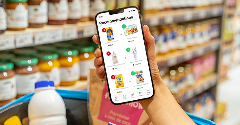News
Top Gluten-free Opportunities for 2014 and Beyond
25 Nov 2014Gluten-free food continues to boom, with global value sales almost doubling over 2008-2013 – and it is not going to stop there. Further growth will be propelled by the fact that these products are increasingly aimed at “gluten-reducers” rather than strict “gluten-avoiders”. This opens up new avenues in foodservice, an environment previously very reluctant to […]

Gluten-free food continues to boom, with global value sales almost doubling over 2008-2013 – and it is not going to stop there. Further growth will be propelled by the fact that these products are increasingly aimed at “gluten-reducers” rather than strict “gluten-avoiders”. This opens up new avenues in foodservice, an environment previously very reluctant to provide gluten-free menu options. With the protein trend in full swing and meat in the doghouse, health and wellness shoppers will be looking for gluten-free meat alternatives, and there is also still plenty of room for improvement on the nutrition front.
Foodservice embraces gluten-free
Probably the greatest development in gluten-free over the past few years has been the unrelenting drive for convenience. In the early days coeliac sufferers could buy only the most basic of products, such as bread, pasta, flour and perhaps, if they were lucky, a cardboard-textured pizza base. The rest had to be made from scratch, at home. These days, everything, from fancy cakes to every conceivable kind of ready meal, is available in a gluten-free variant.
The most glaring of availability gaps is no longer the supermarket shelf, but foodservice menus. In the past, establishments such as cafés and restaurants, understandably, did not want to engage in the gluten-free market. Accidental contamination with gluten as a result of using the same food preparation surfaces and kitchen utensils as those used for standard fare posed too big a headache for too small an audience to cater for. Now, however, with most “gluten-conscious” consumers not actually suffering from the debilitating coeliac disease (a condition in which the body’s immune system attacks gluten, causing severe damage to the intestinal lining) the presence of miniscule amounts of gluten is not going to deter most customers from ordering a “gluten-free” dish. Restaurants will have to take care, though, to advise every customer at the point of ordering such a menu item of any possible risk of cross-contamination that may have occurred on its premises.
Boulder Brands, previously known as Smart Balance, which led the US gluten-free food environment with a 36% value share in 2013, regards foodservice as “one of the most exciting opportunities” for gluten-free. The company supplies mid-sized chains such as Donato’s (a pizza restaurant chain), Smashburger, Red Robin and TGI Friday with items such as gluten-free buns and pizza bases.
Large chains, particularly in the fast food realm, continue to show resistance to gluten-free, but will eventually need to adapt to changing consumer preferences. Gluten-free menu items will soon be just as essential as offering a vegetarian choice.
Meat-free no place for gluten
Meat consumption across much of Western Europe and North America is declining, and meat’s steadily worsening reputation when it comes to healthy eating is one of the primary factors for consumers turning to meat alternatives, and plant-based proteins in general. Protein just happens to be the rising star in the weight management firmament, and in order for health and wellness shoppers to keep up their protein intake, the rush will be on for vegetarian sources. Our packaged food data show that frozen meat substitute value sales increased by a notable 6% globally in 2013, mirroring the previous year’s performance. Germany, well known for its traditionally meat-centred food culture, mustered an extraordinarily dynamic 23%, Australia 10% and Ireland 9%.
It goes without saying that a growing number of weight-conscious consumers will desire their meatless ‘healthy protein’ to be free of gluten as well. Clearly conscious of where things are going, Canada-based meat-alternatives producer Gardein launched a gluten-free beefless burger under its eponymous brand in February 2014, with two more products – a black bean burger and a veggie burger – due to join the line-up in April.
Many companies already offer comparable products, but despite containing gluten-free ingredients, they cannot be marketed as gluten-free because they have been produced on the same production lines as items that contain gluten. Mycoprotein-based Quorn Chik’n Tenders (GBO Premier Foods), on sale in the US, is one such example.
From no gluten to low gluten
A possible solution to the accidental contamination conundrum can be found in Australia, where such products are labelled/marketed as “low gluten”, instead of “gluten-free”. In March 2014 Pie Face, an Australian bakery café chain, added a low-gluten pie to its product range. The product contains only gluten-free ingredients, but the company struggles to exclude the possibility of cross-contamination, and thus the pie is officially sold as “low-gluten”.
For gluten-reducers, for whom it is all about cutting down on gluten rather than eliminating it from their diet completely, low-gluten products are perfectly suitable. Furthermore, they can be offered at a much lower price than “gluten-free” fare because they do not require custom-built production facilities nor, as in the case of foodservice establishments, separate kitchen space and equipment.
“Low-gluten” products, given sufficient consumer education, which emphasises the message that low-gluten products are in fact made entirely from gluten-free ingredients, but may contain minute traces of gluten – which are of concern only for those suffering from the medical condition known as coeliac disease.
Functional gluten-free
Finally, gluten-free needs to make a more concerted effort in tackling its major weakness: low nutritional value. Health professionals have long criticised manufacturers of gluten-free foods for churning out products made from highly refined starches and gluten replacers such as xanthan gum, which lack any nutritive merits beyond empty calories. For public health reasons, many countries have laws requiring standard white wheat flour to be fortified with vitamins and minerals, such as calcium and folic acid, but this does not apply to gluten-free flours.
Health and wellness consumers are nowadays quite nutrition-savvy, and nutritionally substandard products, gluten-free or not, just will not do. In reality, there is absolutely no valid reason why gluten-free flour should not be fortified.
The scope for new product developments in this area is staggering. Naturally gluten-free ancient grains, such as amaranth and quinoa, for example, are high in protein and fibre, which keys into two major current health and wellness trends. Even food industry by-products can be used to augment the nutritional merit of gluten-free offerings.
For instance, in March 2014 the Journal of Food Science published a joint study on this subject, carried out by Guelph Food Research Centre in Canada and the University of Novi Sad in Serbia. Researchers used hemp flour, a by-product of the hemp oil industry, combining it with decaffeinated green tea leaves to produce crackers with functional properties. Hemp flour is rich in fibre, minerals, omega-3 and phytochemicals; the latter also applies to tea leaves. The value of such ingredients in the creation of functional gluten-free products is obvious, and waiting to be exploited.
It is worth pointing out that there may also be something of a marketing problem. Many gluten-free products contain what can be termed “supergrains” or “superseeds”, such as chia, quinoa, millet, amaranth, lupin seeds and so on, but, besides featuring in the ingredient listings, no special attention is drawn to their presence. It may be true that in some cases the quantities are too low, and/or that the flour extracts are too heavily refined to retain their lauded nutritional properties, but it is a starting point. Perhaps, with some tweaking, the manufacturer may end up with a nutritionally supercharged gluten-free product worth making some noise about.
Gluten-free Market Explosion – Will the Gluten-free Boom Continue Indefinitely?
Ewa Hudson, Head of Health and Wellness Research at Euromonitor International
Presentation Time: Wednesday, 3 December 2014, 13.30pm – 14.00pm
Industry Insight Theatre
Presentation Description: Gluten-free eating is taking the world by storm. From beer to cookies, gluten-free products have managed to position themselves as differentiated food alternatives in modern grocery retailers. And it is not just all about gluten-free pasta, bread and biscuits. Exciting new opportunities are also emerging for fresh food, including starchy roots, vegetables and pulses and snacks. The new generation of gluten-free consumers is really not that difficult to cater for as it cares less about purity and more about choice and variety.
In this presentation, Ewa Hudson, Global Head of Health and Wellness at Euromonitor International will explore which regions are driving
growth in gluten-free foods and the key categories to watch moving forward.
Link: http://www.figlobal.com/hieurope/features/show-features/industry-insight-theatre
Related news

Digital platform can help optimise the protein quality of plant-based meals
29 Dec 2025
Researchers at Wageningen University have developed a metric to assess – and optimise – the protein quality of plant-based meals.
Read more
Debate over ban on ‘meaty’ names for plant-based products reaches stalemate
26 Dec 2025
The debate over a ban on plant-based products using “meaty” terms has reached a stalemate, leaving manufacturers in limbo and still facing overhauls to their marketing and packaging.
Read more
Our most-read articles of 2025
23 Dec 2025
From trade tariffs to heavy metals in protein, we look back at some of the industry’s highlights of 2025 and round up our most-read stories of the year.
Read more
Bigging up bean-based products and consumption in Britain
19 Dec 2025
Non-profit organisation the Food Foundation has launched a campaign, “Bang in Some Beans”, designed to increase UK consumers’ legume consumption.
Read more
Pioneers of circular plastic packaging push for new policies
18 Dec 2025
Some of the world’s largest food and drink companies have grown frustrated at investing in circular packaging systems, as the majority “wait on the sidelines”.
Read more
Which sustainability-related labels are consumers willing to pay a premium for?
10 Dec 2025
Products with animal welfare and geographic origin labels elicit a higher willingness to pay a premium than those with carbon-related labels, research suggests.
Read more
Sorghum emerges as better-for-you hero ingredient
9 Dec 2025
With the launch of Novak Djokovic’s sorghum-based brand, the grain’s popularity in the better-for-you snacking sphere is on the rise, thanks to its nutritional and sensory properties.
Read more
Innovation promise in 'maturing' plant-based dairy alternatives market
8 Dec 2025
Plant-based dairy is a maturing market that still faces significant hurdles around taste, functionality, nutrition, and price, but industry is innovating fast, according to experts speaking at Fi Europe.
Read more
Celebrating the winners of the Fi Europe Innovation Awards 2025
3 Dec 2025
Food industry stakeholders celebrated as the winners of the Fi Europe Innovation Awards were announced at a ceremony in Paris.
Read more
Yuka’s food scanning app helps consumers make healthier choices
2 Dec 2025
Global food scanning app Yuka helps consumers understand the content of their shopping baskets and shapes producers’ reformulation plans.
Read more